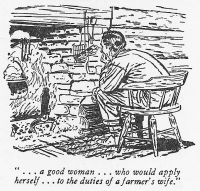|
FEBRUARY 26, 1851 – Today there is more memorable news about the Rail
Road. Yesterday, a Tuesday, I was honored to be among those who made the
first trip by rail between Milwaukee and Waukesha. People lined the rails
along the entire distance of 20 miles, cheering in enthusiasm as we sped
by at 25 miles an hour.
Mud abounded in the streets and roads as we gathered at the Rail Road
Depot but nevertheless there was a great throng in attendance.
About 250 of us, including many ladies, were accommodated in neat and
comfortable cars.
Those with whom I had occasion to converse on the train are of the
unanimous opinion that The Milwaukee & Mississippi Rail Road ushers in a
new era for Wisconsin. By the eventual completion of this project new
markets will be opened in the interior, the editor of the Waukesha
Democrat assured me.
 Despite yesterday's festivities and the attendant excitement I find
myself depressed tonight with loneliness. Would that I could meet a good
woman, comely if possible, who would apply herself diligently to
fulfilling the duties of a farmer's wife. Despite yesterday's festivities and the attendant excitement I find
myself depressed tonight with loneliness. Would that I could meet a good
woman, comely if possible, who would apply herself diligently to
fulfilling the duties of a farmer's wife.
JUNE 4, 1852 – This shall be a very brief but important entry in my
diary. Today I recited my marriage vows at a church in Milwaukee. My
bride, who is newly arrived in this country having come here with her kin
from Norway only six months ago, seems to be of a very industrious nature.
She also is a handsome woman.
SEPTEMBER 6, 1852 – A most unusual organization has been formed in
Milwaukee, a group of prominent business and professional men who call
themselves the Jenny Lind Club.
It seems that when Miss Lind came to this country, several Milwaukee
gentlemen, enthralled at the thought of hearing her melodious songs,
formed a party and went to New York for that purpose.
Each member of the party so enjoyed the company of the others, it is
said, that upon their return to Milwaukee they organized the club. It is
not only exclusive, but now has become positively a secret institution.
 MARCH 15, 1854 – There has been much
exciting news of late, most of it having to do with a runaway slave,
Joshua Glover, who for some time has been employed in the vicinity of
Racine. Five nights ago the cabin he occupied was visited by a half dozen
men who overpowered Glover and put him in irons. Later it developed that
the intruders included a slave catcher from St. Louis named Garland and a
U. S. Deputy Marshall's posse from Milwaukee. Glover, manacled and
bleeding, was conveyed in an open wagon to Milwaukee where he was lodged
in the county jail. MARCH 15, 1854 – There has been much
exciting news of late, most of it having to do with a runaway slave,
Joshua Glover, who for some time has been employed in the vicinity of
Racine. Five nights ago the cabin he occupied was visited by a half dozen
men who overpowered Glover and put him in irons. Later it developed that
the intruders included a slave catcher from St. Louis named Garland and a
U. S. Deputy Marshall's posse from Milwaukee. Glover, manacled and
bleeding, was conveyed in an open wagon to Milwaukee where he was lodged
in the county jail.
As news of the affair spread there were
popular uprisings, both in Milwaukee and at Racine. The Racine citizens
passed several resolutions, terming the seizure a "kidnapping," and
demanding that Glover be given a trial by jury. They concluded their
meeting by resolving that the slave catching law enacted by Congress in
1850 was "disgraceful" and thereupon repealed it.
Upon the adjournment of the Racine meeting,
about 100 citizens from that city came to Milwaukee where a similar
protest was underway. Mr. Sherman M. Booth, editor of the Milwaukee Free
Democrat, rode throughout the town on a horse crying "Freedom to the
rescue. Slave catchers are in our midst!" The local militia was summoned
to keep order but the members declined to assemble.
Racine and Milwaukee citizens banded
together for strenuous action and soon battered down the jail door to
release Glover. I understand he was spirited to the underground and now is
well on his way to Canada. Many prominent persons were among those
wielding the battering ram, I was told by those witnessing the event,
including Mr. Edward P. Allis, the young Milwaukee industrialist.
Another interesting development has
occurred in Ripon, where a new political group called the Republican Party
was organized on the first day of this month under the leadership of Mr.
Alvan E. Bovay, a lawyer who came to Ripon from New York in 1850.
I understand that Mr. Bovay, reported to be
an intimate friend of Mr. Horace Greeley, the eastern newspaper man, has
urged the formation of such a party since 1852 so all anti-slavery men
could unite under one banner. Men of many parties – the Whigs, Free
Soilers and Democrats – went into the meeting but they all came out of it
Republicans. |
